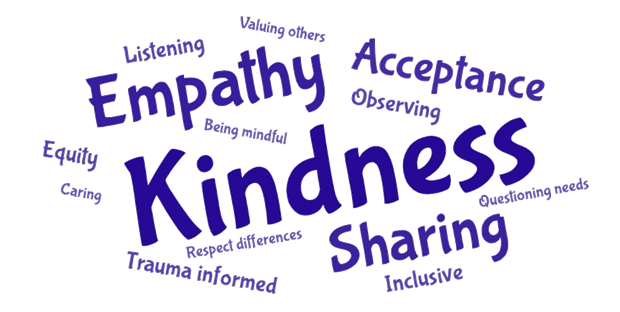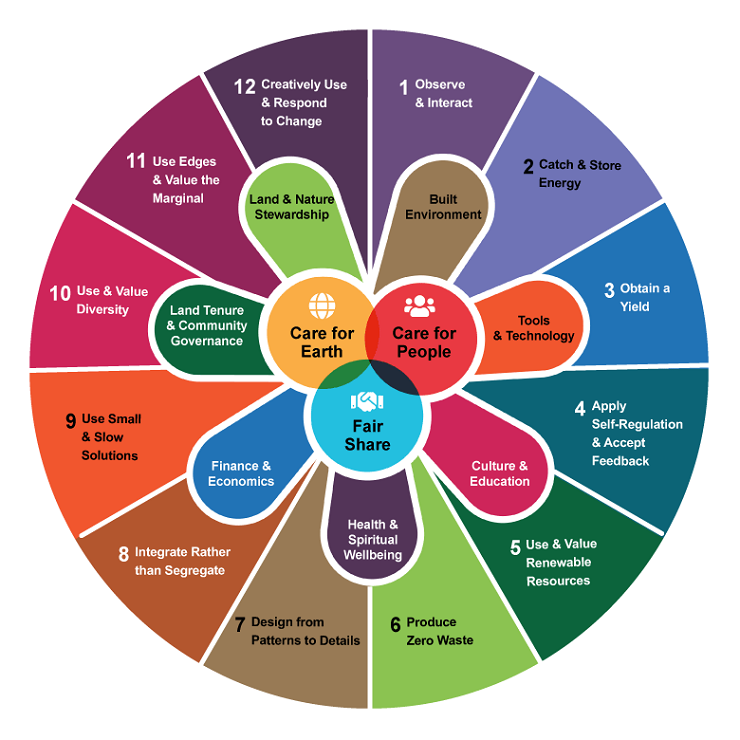The pedagogies were:
- Learning through compassion
- Traditional wisdom as a sustainable pedagogy
Participants discussed their understanding of compassion, and why compassion may be a useful idea for learning and thinking sustainably.
Compassion is:

Compassion is useful in thinking about sustainability as it demands an empathetic approach to both local and international human and non-human communities. It models ways to think about your actions and footprint and to understand your place alongside others working collectively. Developing compassionate thinking through such pedagogies can nurture sustainable individuals in life and work.
Examples of compassionate pedagogies:
Poems, story-telling, art, music, listening with empathy, valuing learners’ contributions, building relationships, having the space and tools to be heard, supporting agency/change, and project work with collaborative/cooperative approaches.
Traditional Wisdom
Several permaculture principles stood out for participants. For example, ‘Integrate rather than segregation’ as working together can be far more productive than working in isolation; ‘creatively use and respond to change’ is a key life skill and may drive commitment to sustainability. Being adaptable seems to be key. The principles could be implemented in parallel with any focus or vary over time, or for different aspects of work.
 Figure 1 The Permaculture FlowerIn the centre of the image are three core principles: care for Earth, care for people and fair share. The second layer of the 'flower' is seven categories: land and nature stewardship, built environment, tools and technology, culture and education, health and spiritual wellbeing, finance and economics, land tenure and community governance. The outer layer of the flower has the following 12 principles: Observe & Interact, Catch & Store Energy, Obtain a Yield, Apply Self-Regulation & Accept Feedback, Use & Value Renewable Resources, Produce Zero Waste, Design from Patterns to Details, Integrate Rather than Segregate, Use Small & Slow Solutions, Use & Value Diversity, Use Edges & Value the Marginal and Creatively Use & Respond to Change.
Figure 1 The Permaculture FlowerIn the centre of the image are three core principles: care for Earth, care for people and fair share. The second layer of the 'flower' is seven categories: land and nature stewardship, built environment, tools and technology, culture and education, health and spiritual wellbeing, finance and economics, land tenure and community governance. The outer layer of the flower has the following 12 principles: Observe & Interact, Catch & Store Energy, Obtain a Yield, Apply Self-Regulation & Accept Feedback, Use & Value Renewable Resources, Produce Zero Waste, Design from Patterns to Details, Integrate Rather than Segregate, Use Small & Slow Solutions, Use & Value Diversity, Use Edges & Value the Marginal and Creatively Use & Respond to Change.
Promoting transformative change can depend on the learner and
context, the following principles were highlighted:
- Apply self-regulation and accept feedback
- Use and value diversity
- Integrate rather than segregate
Examples of learner activities:
- Student campaigns
- Assessments that reduce barriers related to assumed lived experience
- Tools to support learners to share ‘where/who they are’
- Optionality in what is studied/assessed
- Diverse examples/voices
- Resources to support the purpose of feedback – how this can be managed e.g. re-read the next day, seek support.
Memo cards were created to reflect on these sustainable pedagogies.
Rate and Review
Rate this video
Review this video
Log into OpenLearn to leave reviews and join in the conversation.
Video reviews